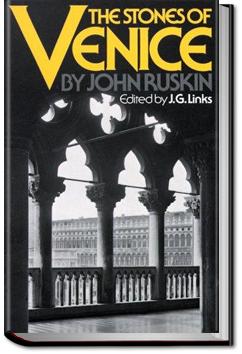UNLIMITED Audiobooks and eBooks
Over 40,000 books & works on all major devices
Get ALL YOU CAN for FREE for 30 days!
The Stones of Venice, Volume 3
John Ruskin
Book Overview:
The Stones of Venice is a three-volume treatise on Venetian art and architecture by English art historian John Ruskin. Intending to prove how the architecture in Venice exemplified the principles he discussed in his earlier work, The Seven Lamps of Architecture, Ruskin examined the city in detail, describing for example over eighty churches. He discusses architecture of Venice's Byzantine, Gothic and Renaissance periods, and provides a general history of the city as well. The book aroused considerable interest in Victorian Britain and beyond. The chapter "The Nature of Gothic" (from volume 2) was admired by William Morris, who published it separately in an edition which is in itself an example of Gothic revival. It inspired Marcel Proust; the narrator of the Recherche visits Venice with his mother in a state of enthusiasm for Ruskin. The Stones of Venice is considered one of the most influential books of the 19th century.
The Stones of Venice is a three-volume treatise on Venetian art and architecture by English art historian John Ruskin. Intending to prove how the architecture in Venice exemplified the principles he discussed in his earlier work, The Seven Lamps of Architecture, Ruskin examined the city in detail, describing for example over eighty churches. He discusses architecture of Venice's Byzantine, Gothic and Renaissance periods, and provides a general history of the city as well. The book aroused considerable interest in Victorian Britain and beyond. The chapter "The Nature of Gothic" (from volume 2) was admired by William Morris, who published it separately in an edition which is in itself an example of Gothic revival. It inspired Marcel Proust; the narrator of the Recherche visits Venice with his mother in a state of enthusiasm for Ruskin. The Stones of Venice is considered one of the most influential books of the 19th century.
How does All You Can Books work?
All You Can Books gives you UNLIMITED access to over 40,000 Audiobooks, eBooks, and Foreign Language courses. Download as many audiobooks, ebooks, language audio courses, and language e-workbooks as you want during the FREE trial and it's all yours to keep even if you cancel during the FREE trial. The service works on any major device including computers, smartphones, music players, e-readers, and tablets. You can try the service for FREE for 30 days then it's just $19.99 per month after that. So for the price everyone else charges for just 1 book, we offer you UNLIMITED audio books, e-books and language courses to download and enjoy as you please. No restrictions.
§ XXXI. There is, indeed, much difference in this respect between the tendencies of different branches of knowledge; it being a sure rule that exactly in proportion as they are inferior, nugatory, or limited in scope, their power of feeding pride is greater. Thus philology, logic, rhetoric, and the other sciences of the schools, being for the most part ridiculous and trifling, have so pestilent an effect upon those who are devoted to them, that their students cannot conceive of any higher sciences than these, but fancy that all education ends in the knowledge of words: but the true and great sciences, more especially natural history, make men gentle and modest in proportion to the largeness of their apprehension, and just perception of the infinit. . . Read More
Try now for FREE!

"Love your service - thanks so much for what you do!"
- Customer Cathryn Mazer
"I did not realize that you would have so many audio books I would enjoy"
- Customer Sharon Morrison
"For all my fellow Audio Book & E-Book regulars:
This is about as close to nirvana as I have found!"
- Twitter post from @bobbyekat



Community Reviews
Much more limited than the first two volumes and, to me, much less interesting. This volume (The Decline) is merely a run down on the degradation of Venetian architecture that coincided with the introduction of Renaissance architecture and the decline of the city on the world stage. Some interesting
If you're going to read just one book before visiting Venice, find something else, for this three volume set is far too long and should be read slowly. You'll be amazed how little you knew about architecture, how interesting it is from basic wall to intricacy of ornament, and how much and how well t